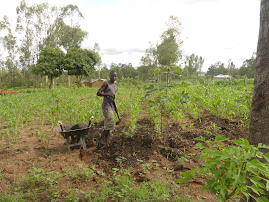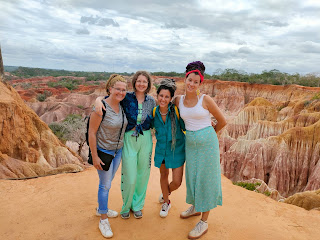My second month in Shianda has gone, and I can finally seem to have understood what my purpose here can be.
It has been quite hard at the beginning because I was not sure about what to do here, or how to be useful. However, I learned that ideas and their development just come naturally.
I conducted a needs assessment, visiting twelve groups, and asking them about their activities. Once you see that farmers are struggling against the same problems, it becomes easier to find a possible solution. I decided to try to find a way to increase the number of vegetables they cultivate, tackling the two main constraints farmers usually face: lack of water and lack of land.
What do we do when the space is horizontally limited? We go vertically! Growing crops in sacks will allow planting vegetables like kale, spinach, cabbage, tomato, and onions in a reduced space. Moreover, the bags can contain water better than the soil, which drains easily.
 |
| Avocado seedlings dying in a nursery due to lack of water (Khunyri Orphans group) |
 |
| An example of vertical bag seen from the top |
These days I am busy organizing training on this topic for around 40 smallholder farmers. On one hand, I like the idea that this activity may enable them to improve their diets when consuming these vegetables, or their income when selling them. On the other hand, this can also be kind of stressful and scary.
 |
| Monthly meeting with the chair ladies of the community groups |
When you find yourself in a place like Shianda, and you start paying visits to the groups, to the local people, in their houses, meeting their families, and you listen to them sharing their life with you, you see you are in the right position to do something to help. Coming from Europe, with all possible economic means but a Western mindset, gives you the impression that you really do not know what you are really doing out of your possibilities, nor what you could do to have an impact on the wellbeing of the local population. It seems hard to detect where people place the border between everyday normal challenges and life struggles. Some things are not seen as a real problem, but just like the normal way of life here.
 |
| Use of compost to fertilize the soil |
A funny example is how we consider washing clothes by hand as something dated and an avoidable activity, while people here do not trust washing machines. They do not understand how we can rely on some technology incapable of detecting stains as the human eye is.
This is to say that finding solutions to many problems can be very hard due to cultural differences, as there are different ways of seeing and interpreting reality.
 |
| Visiting Wichelu group and one of their composting sites |
I do not know if I really understood the community, how things work, and what people are expecting me to do for them, but at least I will give it a try with this new idea. My final aim is, of course, to have a real impact on the life of these people, at least on those of some members of each group.


































